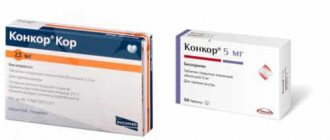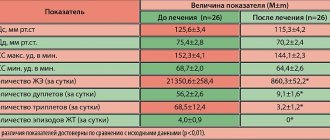Contraindications
Concor should not be used for the following diseases:
- cardiogenic shock;
- acute heart failure;
- chronic heart failure (CHF) in the stage of decompensation, which requires the use of inotropic therapy;
- sinoatrial block;
- atrioventricular (AV) block of II–III degree in patients without a pacemaker;
- severe bradycardia with heart rate less than 60 beats per minute;
- sick sinus syndrome;
- severe arterial hypotension [systolic blood pressure (BP) below 100 mmHg];
- Raynaud's syndrome or severe peripheral arterial circulation disorder;
- severe form of bronchial asthma;
- chronic obstructive pulmonary disease in severe form;
- metabolic acidosis;
- pheochromocytoma (without simultaneous use of alpha-blockers);
- age under 18 years;
- breastfeeding period;
- hypersensitivity to the components of the drug.
Cases of overdose
In case of overdose, there is a severe drop in blood pressure and other dangerous consequences:
- exacerbation of heart failure;
- hypoglycemia;
- bronchospasm;
- AV block;
- bradycardia.
Treatment is symptomatic, depending on the nature of the exacerbation. For example, to relieve the symptoms of bradycardia, atropine is administered, and in case of glycemia, a glucose solution is administered. If bronchospasm is observed, it is treated with Aminophylline. In case of a serious condition, it is necessary to call emergency assistance as quickly as possible.
Doses and method of administration of Concor
Figure 2 - Dosage and method of use of the drug Concor
Concor is taken orally (do not chew or crush) once a day with a glass of water, regardless of meals. But there is a dependence on the time of day. The medicine should be taken exclusively in the first half of the day, that is, you cannot take Concor during the day, evening or at night.
As for the duration of therapy, it is determined by the body’s reaction and the decision of the attending physician.
- Arterial hypertension and angina pectoris
The dose of the drug is calculated taking into account the heart rate and general condition of the patient.
To begin with, Concor is prescribed 5 mg, one tablet per day. Then they go up to 10 mg. And in the treatment of hypertension and angina pectoris, the maximum recommended dose is 20 mg per day.
- Chronic heart failure without signs of exacerbation
Initially, 1.25 mg once a day. If the patient tolerates the dosage well, then it is gradually increased every two weeks to 2.5 mg, 3.75 mg, 5 mg, 7.5 mg and 10 mg.
If the dosage is poorly tolerated, then it should be reduced. The maximum recommended dose is 10 mg per day.
Comparison of the safety of Coronal and Bisoprolol
The safety of a drug includes many factors.
At the same time, in Coronal it is quite similar to Bisoprolol. It is important where the drug is metabolized: drugs are excreted from the body either unchanged or in the form of products of their biochemical transformations. Metabolism occurs spontaneously, but most often involves major organs such as the liver, kidneys, lungs, skin, brain and others. When assessing the metabolism of Coronal, as well as Bisoprolol, we look at which organ is the metabolizing organ and how critical the effect on it is.
The risk-benefit ratio is when the prescription of a drug is undesirable, but justified under certain conditions and circumstances, with the obligatory observance of caution in use. At the same time, Coronal does not have any risks when used, just like Bisoprolol.
Also, when calculating safety, it is taken into account whether only allergic reactions occur or possible dysfunction of the main organs. In other matters, as well as the reversibility of the consequences of using Coronal and Bisoprolol.
Side effects
Taking Concor may be accompanied by side effects:
- From the nervous system: increased fatigue, dizziness, headache, sleep disturbances, depression may be observed (especially at the beginning of therapy), rarely - hallucinations (usually mild and disappear within 1-2 weeks), sometimes - paresthesia.
- On the part of the organ of vision: visual disturbances, decreased tear production (must be taken into account when wearing contact lenses), conjunctivitis.
- From the cardiovascular system: in some cases - orthostatic hypotension, bradycardia, AV conduction disturbances, decompensation of heart failure with the development of peripheral edema, at the beginning of treatment - deterioration of the condition of patients with intermittent claudication or Raynaud's syndrome.
- From the respiratory system: in isolated cases - shortness of breath (in patients prone to bronchospasm).
- From the gastrointestinal tract: in some cases - diarrhea, constipation, nausea, abdominal pain, increased activity of liver enzymes in the blood serum (AST, ALT), hepatitis.
- From the musculoskeletal system: in some cases - muscle weakness, cramps, arthropathy affecting one or more joints (mono- or polyarthritis).
- From the endocrine system: decreased glucose tolerance (with latent diabetes mellitus) and masking of signs of hypoglycemia, in some cases - increased TG levels in the blood, potency disorders.
- On the skin: sometimes - itching, skin hyperemia, increased sweating, rash. When treated with beta-adrenergic receptor blockers, hair loss, hearing impairment or tinnitus, weight gain, mood changes, short-term memory loss, allergic rhinitis, and priapism are observed in some cases.
Concor during pregnancy
Figure 3 - Taking Concor during pregnancy
Expectant mothers should be extremely careful when choosing certain medications. In the case of Concor, you can take it only if the benefit to the mother’s body is greater than the damage. Concor should not be taken during lactation, since the baby receives bisoprolol and auxiliary components through breast milk. If discontinuation of the drug is not possible, then breastfeeding should be discontinued.
Comparison of addiction between Coronal and Bisoprolol
Like safety, addiction also involves many factors that must be considered when evaluating a drug.
So, the totality of the values of such parameters as “o syndrome” in Coronal is quite similar to the similar values in Bisoprolol. Withdrawal syndrome is a pathological condition that occurs after the cessation of intake of addictive or dependent substances into the body. And resistance is understood as initial immunity to a drug; in this it differs from addiction, when immunity to a drug develops over a certain period of time. The presence of resistance can only be stated if an attempt has been made to increase the dose of the drug to the maximum possible. At the same time, Coronal has a fairly low incidence of “syndrome”, just like Bisoprolol.
Interaction with other drugs and alcohol
Figure 4 - Combination of Concor with other medications
The instructions for the drug Concor describe in some detail the compatibility with other drugs, because there is a list of drugs with which the Concor tandem is prohibited. Concor can be used in conjunction with analogues and generics, but such a combination must be discussed with your doctor so that an overdose does not occur and the blood pressure does not drop below normal levels.
Concor and Amlodipine
Amplodipine is an antihypertensive drug used for high blood pressure. The attending physician may prescribe a similar tandem if he believes that Concor will be ineffective. It is worth remembering that patients with heart failure cannot take Amplodipine and Concor together.
Concor and Arifon
Arifon - a diuretic indapamide - in combination with the beta blocker Concor is an effective complex in the treatment of hypertension. Concor lowers blood pressure, and Arifon reduces the volume of circulating blood, thus protecting the patient from signs of heart failure.
But Arifon has a side effect - it flushes potassium from the body, which can cause hypokalemia.
Concor and Lozap
The active substance of the drug Lozap, losartan potassium, is intended for the treatment of arterial hypertension. That is, it does not allow peripheral vessels to spasm and thereby does not allow blood pressure to rise. Concor and Lozap enhance each other's effects. Concor works to reduce cardiac output, while Lozap dilates arterioles and reduces peripheral pressure. As a result, blood pressure returns to normal.
The combination of drugs Concor and Lozap is most effective when the degree of arterial hypertension is quite high, and treatment with one drug is not so effective.
Concor and Enap
The simultaneous use of Concor and Enap or Enalapril, which are based on the same active ingredient - enalapril, should be prescribed with caution, since the drugs can enhance the effect of each other. So, the instructions say: with the simultaneous use of beta-blockers, methyldopa, nitrates, calcium channel blockers, hydralazine, prazosin, the antihypertensive effect may be enhanced. That is, blood pressure that is already lowered with the help of Concor can decrease further.
Enap is good for kidney disease, excess weight and a history of diabetes. Concor is indicated for use in patients with heart rhythm disturbances, tachycardia, and frequent attacks of angina. But if the resting heart rate is 50 - 60 beats/min, and there are conduction blockades, then you should take Enap, since Concor will only worsen these conditions.
The combined use of Concor and Enalapril lowers blood pressure and slows the progression of complications from the heart and kidneys. If you experience constant weakness, dizziness and fatigue during use, you should immediately inform your doctor.
Concor and Prestarium
Like all other ACE inhibitors, Prestarium goes well with the β1-blocker Concor. They are prescribed in tandem for high blood pressure, when the use of one drug is ineffective, reducing the risk of fatal complications for people with heart failure, obesity, diabetes, and chronic kidney disease.
But the decision to prescribe the combination Concor + Prestarium is made by the attending physician.
Prestarium itself is not as effective a medicine as Concor. If the pressure is 180/105 mmHg. Art., then it must be taken in combination with other drugs for hypertension.
Concor and Moxonidine
Concomitant use of Moxonidine with β-blockers such as Concor is not recommended. This can lead to a decrease in myocardial contractility and increased bradycardia
Concor and Lorista
Lorista is a generic version of the drug Lozap. That is, it contains the same active ingredient as the original drug, but it has not passed all stages of clinical trials. Generic status makes medicines cheaper without losing their properties. Lorista contains valsartan, a drug belonging to the group of sartans, which are prescribed for the development of a dry cough due to ACE inhibitors. The combination of Concor and Lorista is inferior in strength to the combination of Concor and any ACE inhibitor, since Lorista does not reduce the risk of complications of coronary artery disease.
Concor and alcohol
Figure 5 - Drinking alcohol with the drug Concor
It is known that when drinking alcohol, blood vessels dilate for a short time, that is, the heartbeat accelerates. True, after a short amount of time the opposite happens - vasospasm. And a sharp rise in blood pressure is not the most pleasant, but also not the most dangerous, thing that can await a patient taking Concor. The instructions directly state that Concor and alcohol are incompatible. The central nervous system is depressed, and the patient’s psychomotor abilities deteriorate. Also, do not forget that the medicine and alcohol will be excreted through one excretory system - the kidneys. This can lead to organ damage, and in some cases functional impairment may develop. Internal bleeding may begin, a hypertensive crisis, pulmonary edema, and vascular collapse may begin. But the worst result of taking Concor and alcohol together is death.
Therefore, doctors strongly recommend that you stop drinking alcohol while taking Concor.
Analogs
When choosing analogues, it is important to understand that each of them has its own indications for use, side effects, contraindications, active substances, etc. It is important to consult a doctor and not change the drug yourself.
Which is better: Concor, Bisoprolol, Coronal?
All of these drugs contain the same active substance - bisoprolol. They have similar contraindications and indications for use.
Bisoprolol is used to treat arterial hypertension, tachycardic heart rhythm disorders, ischemia, heart failure and various forms of arrhythmia. It is considered antihypertensive and lowers blood pressure. Patients whose blood pressure is 90 mm or lower (hypotension) are prohibited from taking Bisoprolol. It is easier to tolerate by patients and there is less risk of complications when taking it. This applies to diabetes mellitus, respiratory tract diseases, and hypotension.
Coronal is a generic version of Concor, that is, it has the same spectrum of pharmacological action as the original drug, but differs in strength. Coronal also reduces pain and blood pressure, improves blood supply to the heart muscle, and normalizes heart rhythm. But Coronal does not have such a noticeable effect on the patient’s heart rate.
Which is better: Concor, Betalok Zok, Betalok or Egilok?
The active ingredient in the drugs Betalok ZOK, Betalok and Egilok is the same - metoprolol.
The effectiveness of Concor and Betaloc ZOK in reducing blood pressure and stopping attacks of tachycardia is the same. The duration of the therapeutic effect lasts more than a day. But only a cardiologist has the right to prescribe Concor or Betaloc ZOK, having studied the risk factors, medical history and individual sensitivity of the patient to the components of the drug.
Betaloc is a medicine for hypertension, angina and heart failure. Today it is considered obsolete. He was replaced by Betalok ZOK.
Egilok, like Concor, is effective for high blood pressure, but since the active components are different, there are differences. Compared to Concor, Egilok acts very quickly (15-20 minutes after taking the tablet), but this means that the duration of the therapeutic effect is not so long. The drug should be taken two to three times a day during or after meals.
Which is better: Concor, Nebivolol or Nebilet?
The drugs have a positive effect on the heart with high blood pressure, chronic heart failure, ischemia, tachycardia, but Nebilet and its almost complete analogue Nebivolol are based on the active component - nebivolol, which is capable of dilating peripheral vessels and reducing cardiac output. This adds to its effectiveness as an antihypertensive agent.
The active substance nebivolol promotes the production of nitric oxide, which relaxes blood vessels for a longer period. Unlike Concor, it does not contribute to the patient’s weight gain. Since nebivolol dilates blood vessels, it acts faster, but the effect does not last long.
Nebilet and differing from it solely in the degree of purification and, accordingly, in price, Nebivolol is also used for hypertension and coronary heart disease. But it is contraindicated in patients with low blood pressure, cardiogenic shock, severe heart failure, diseases of the respiratory system and liver. Not for use by children, pregnant and lactating women. Treatment should not be started if you have diabetes, thyroid dysfunction, psoriasis or in old age. Concor is safer for the elderly, children and patients with breathing problems.
Concor or Sotahexal
The active ingredient in Sotahexal, sotalol hydrochloride, copes well with arrhythmia and lowers blood pressure. Contraindicated for use in patients with hypotension.
Sotahexal can cause side effects in the form of bronchospasms, disorders of carbohydrate and lipid metabolism.
Concor, compared to Sotahexal, is easier to tolerate and more effective for patients suffering from chronic heart failure. Also, Concor has a lower risk of complications. This applies to diabetes mellitus (Sotahexal increases hypoglycemia), respiratory diseases, and hypotension. But Sotahexal is more often prescribed for arrhythmic disorders.










